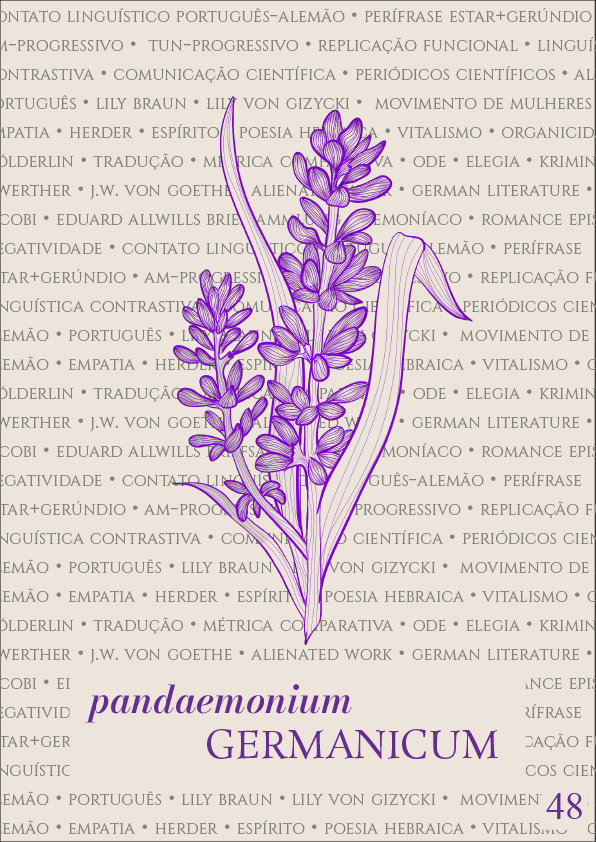The daemonic in the novel Eduard Allwills Briefsammlung’s by Friedrich Jacobi
DOI:
https://doi.org/10.11606/1982-88372648104Keywords:
Friedrich Jacob, Eduard Allwills Briefsammlung, Daemonic, Epistolary Novel, NegativityAbstract
Friedrich Heinrich Jacobi's literary contributions were largely reduced to the philosophical squabbles in which the author participated. However, Jacobi published two important novels which in addition to the good reception they received at the time also c onversed strongly with the trends of their era. This article aims to analyze how the first of these novels, Eduard Allwills Briefsammlung , might be seen as an important contribution to modern literature and to the establishment of trends and structures whi ch were later explored from romanticism on up to contemporary literature. According to our analysis, Jacobi's novel is marked by a strong trait of negativity, and this element is inserted through the main character, Eduard Allwill. By emulating genres such as the epistolary novel or the philosophical novel, Jacobi uses this negativity as a key which produces effects of suspension and subversion in the constitution of a new kind of novel. Our analysis seeks to demonstrate how this negativity is realized thro ugh the concept of the daemonic, inherited from philosophy, and then converted into one of the main components of modern literature.Downloads
References
FRANK, Manfred. “Unendliche Annäherung”: Die Anfänge der philosophischen Frühromantik. Frankfurt am Main: Suhrkamp, 1997.
GIOVANNI, George di. From Jacobi’s Philosophical Novel to Fichte’s Idealism: Some Comments on the 1798-99 “Atheism Dispute”. Journal of theHistory of Philosophy, v. 27, n. 1, 1989, pp. 75-100.
GOETHE, Johann Wolfgang von. De minha vida: Poesia e Verdade. Tradução de Mauricio Mendonça Cardozo. São Paulo: Unesp, 2017.
HEGEL, Georg Wilhelm Friedrich. Fé e Saber. Tradução de Oliver Tolle. São Paulo: Hedra, 2011.
HOLTZMANN, Adolf. Ueber Eduard Allwills Briefsammlung. Dissertation zur Erlangung der Venia Docendi bei der Philosophischen Facultät der Universität Jena. Jena: Druck von Ed. Fromann, 1878.
JACOBI, Friedrich Heinrich. Eduard Allwills Briefsammlung. In: Friedrich Heinrich Jacobi’s Werke. Erster Band. Leipzig: Gerhard Fleischer, 1812, p. 3-400.
JACOBI, Friedrich Heinrich. Main philosophical writings and the novel Allwill. Tradução introdução e notas de George di Giovanni. Montreal: McGill-Queen’s University Press, 1994.
JACOBI, Friedrich Heinrich. Sobre a doutrina de Espinosa em cartas ao senhor Moses Mendelssohn. Tradução de Juliana Ferraci Martone. Campinas: Editora da Unicamp, 2021
LAUTH, Reinhard. Friedrich Heinrich Jacobis Allwill und Fedor Michajlovič Dostoevskijs Dämonen. Russian Literature 2, n. 2, 1973, pp. 51-64.
MARTONE, Juliana. Friedrich Heinrich Jacobi: uma história natural da filosofia especulativa. 2020. Tese de doutorado. FFLCH/USP, São Paulo, 2020.
NENON, Monika. "Daseyn enthüllen": Zum mediengeschichtlichen Kontext von Friedrich Heinrich Jacobis Eduard Allwills Papiere. Goethe Yearbook, v. 24, 2017, pp. 155-174.
PLATÃO. Diálogos: Protágoras –Górgias –O Banquete –Fedão. Vol. III –IV. Tradução de Carlos Alberto Nunes. Belém: UFPA, 1980.
ROUSSEAU, Jean-Jacques. Júlia, ou, A Nova Heloísa. São Paulo: HUCITEC/UNICAMP, 1994.
SCHWARTZ, Hans. Friedrich Heinrich Jacobis “Allwill”. Halle: Druck von Ehrhardt Karras, 1914.STAËL, Germaine de. Œuvres complètes de Mmela Baronne de Staël, publiées par son fils, précédées d'une notice sur le caractère et les écrits de Mmede Staël, par MmeNecker de Saussure, Tome 11. Paris: Treuttell et Würtz, 1820-1821.
STAROBINSKI, Jean. Jean-Jacques Rousseau: a transparência e o obstáculo: seguido de sete ensaios sobre Rousseau. Tradução de Maria Lúcia Machado. São Paulo: Companhia das Letras, 1991.WATT, Ian. A ascensão do romance: estudos sobre Defoe, Richardson e Fielding. São Paulo: Companhia das Letras, 2010.
Downloads
Published
Issue
Section
License
Copyright (c) 2022 Pandaemonium Germanicum

This work is licensed under a Creative Commons Attribution-NonCommercial-NoDerivatives 4.0 International License.



